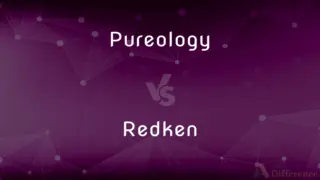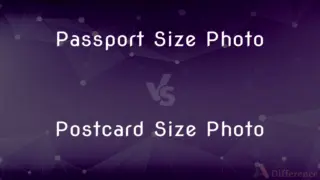Opinion vs. Assertion — What's the Difference?
By Tayyaba Rehman — Updated on December 10, 2023
An opinion is a personal belief or judgment, not necessarily based on fact or knowledge. An assertion is a confident and forceful statement of fact or belief.

Difference Between Opinion and Assertion
Table of Contents
ADVERTISEMENT
Key Differences
Opinions are subjective views, influenced by personal feelings, tastes, or experiences, and are open to debate. Assertions, however, are statements presented as fact, often without supporting evidence.
Opinions typically reflect individual perspectives and can vary greatly among different people. Assertions are made with certainty and are often expected to be accepted as true or valid without question.
In discussions, opinions are usually qualified with phrases like "I think" or "I believe," indicating personal perspective. Assertions are often stated unequivocally, suggesting objective truth.
Opinions are an integral part of personal expression and can change over time with new experiences or information. Assertions, on the other hand, are often used in arguments or claims, and changing them can require admitting error or misjudgment.
While opinions are essential for subjective topics like art or taste, assertions are common in debates or discussions where factual accuracy is contested.
ADVERTISEMENT
Comparison Chart
Nature
Subjective, personal belief
Confident statement of fact or belief
Evidence Requirement
Not necessarily based on evidence or facts
Often presented without supporting evidence
Language Indicators
Phrases like "I think" or "I believe"
Stated unequivocally
Flexibility
Can change with new information
Changing often requires admitting error
Context of Use
Personal expression, subjective topics
Arguments, factual discussions
Compare with Definitions
Opinion
A professional judgment, as of an expert.
The doctor's opinion was that surgery was necessary.
Assertion
A confident and forceful statement of fact or belief.
His assertion that he had never met her was proven false.
Opinion
The formal expression of a professional judgment.
The legal opinion provided clarity on the issue.
Assertion
The act of stating something as true.
His assertion about the historical facts was questioned.
Opinion
A personal view, attitude, or appraisal.
In my opinion, the movie was more entertaining than the book.
Assertion
A declaration that is made emphatically.
Her assertion of her rights was respected by the authorities.
Opinion
A belief or judgment that rests on grounds insufficient to produce complete certainty.
Her opinion on the matter is based on her personal experiences.
Assertion
The act of asserting or affirming something strongly.
Her assertion of innocence was convincing.
Opinion
A belief stronger than impression and less strong than positive knowledge.
It's my opinion that the project will be successful.
Assertion
A positive declaration or statement.
The CEO's assertion of company growth reassured investors.
Opinion
An opinion is a judgement, viewpoint, or statement that is not conclusive, rather than facts, which are true statements.
Assertion
The act of asserting.
Opinion
A belief or conclusion held with confidence but not substantiated by positive knowledge or proof
"The world is not run by thought, nor by imagination, but by opinion" (Elizabeth Drew).
Assertion
Something declared or stated positively, often with no support or attempt at proof.
Opinion
A judgment based on special knowledge and given by an expert
A medical opinion.
Assertion
The act of asserting; positive declaration or averment.
Opinion
A judgment or estimation of the merit of a person or thing
Has a low opinion of braggarts.
Assertion
Something which is asserted; a declaration; a statement asserted.
You're a man of strong assertions!
Opinion
The prevailing view
Public opinion.
Assertion
A statement or declaration which lacks support or evidence.
That's just a bare assertion.
Opinion
A court's formal, usually written statement explaining its reasons for its decision in a case.
Assertion
Maintenance; vindication
The assertion of one's rights or prerogatives
Opinion
An attorney's formal, usually written statement giving an assessment of how the law should be or is likely to be applied in a particular situation.
Assertion
(computer programming) A statement in a program asserting a condition expected to be true at a particular point, used in debugging.
Opinion
A piece of testimony that is not usually admissible when given by a layperson, as in contrast to an opinion given by an expert witness.
Assertion
The act of asserting, or that which is asserted; positive declaration or averment; affirmation; statement asserted; position advanced.
There is a difference between assertion and demonstration.
Opinion
A belief, judgment or perspective that a person has formed, either through objective or subjective reasoning, about a topic, issue, person or thing.
I would like to know your opinions on the new filing system.
In my opinion, white chocolate is better than milk chocolate.
Every man is a fool in some man's opinion.
We invite you to state your opinions about the suggestions.
Assertion
Maintenance; vindication; as, the assertion of one's rights or prerogatives.
Opinion
The judgment or sentiment which the mind forms of persons or things; estimation.
Assertion
A declaration that is made emphatically (as if no supporting evidence were necessary)
Opinion
(obsolete) Favorable estimation; hence, consideration; reputation; fame; public sentiment or esteem.
Assertion
The act of affirming or asserting or stating something
Opinion
(obsolete) Obstinacy in holding to one's belief or impression; opiniativeness; conceitedness.
Opinion
The formal decision, or expression of views, of a judge, an umpire, a doctor, or other party officially called upon to consider and decide upon a matter or point submitted.
Opinion
(European Union law) a judicial opinion delivered by an Advocate General to the European Court of Justice where he or she proposes a legal solution to the cases for which the court is responsible
Opinion
To have or express as an opinion.
Opinion
That which is opined; a notion or conviction founded on probable evidence; belief stronger than impression, less strong than positive knowledge; settled judgment in regard to any point of knowledge or action.
Opinion is when the assent of the understanding is so far gained by evidence of probability, that it rather inclines to one persuasion than to another, yet not without a mixture of incertainty or doubting.
I can not put off my opinion so easily.
Opinion
The judgment or sentiment which the mind forms of persons or things; estimation.
I have bought golden opinions from all sorts of people.
Friendship . . . gives a man a peculiar right and claim to the good opinion of his friend.
However, I have no opinion of those things.
Opinion
Favorable estimation; hence, consideration; reputation; fame; public sentiment or esteem.
Thou hast redeemed thy lost opinion.
This gained Agricola much opinion, who . . . had made such early progress into laborious . . . enterprises.
Opinion
Obstinacy in holding to one's belief or impression; opiniativeness; conceitedness.
Opinion
The formal decision, or expression of views, of a judge, an umpire, a counselor, or other party officially called upon to consider and decide upon a matter or point submitted.
Opinion
To opine.
Opinion
A personal belief or judgment that is not founded on proof or certainty;
My opinion differs from yours
What are your thoughts on Haiti?
Opinion
A belief or sentiment shared by most people; the voice of the people;
He asked for a poll of public opinion
Opinion
A message expressing a belief about something; the expression of a belief that is held with confidence but not substantiated by positive knowledge or proof;
His opinions appeared frequently on the editorial page
Opinion
The legal document stating the reasons for a judicial decision;
Opinions are usually written by a single judge
Opinion
The reason for a court's judgment (as opposed to the decision itself)
Opinion
A vague idea in which some confidence is placed;
His impression of her was favorable
What are your feelings about the crisis?
It strengthened my belief in his sincerity
I had a feeling that she was lying
Common Curiosities
How do opinions differ from assertions?
Opinions are subjective and personal, while assertions are presented as objective truths.
Can opinions be proven?
Opinions are based on personal beliefs and cannot be proven like facts.
Are assertions always true?
Assertions are presented as true, but they may not always be factually correct.
What makes an assertion strong?
Confidence and clarity in stating a fact or belief make an assertion strong.
Can opinions be debated?
Yes, opinions can be debated as they are subjective.
What is an assertion?
An assertion is a confident and forceful statement of fact or belief.
How do we identify an opinion in a statement?
Opinions often include qualifiers like "I think" or "I believe."
What is an opinion?
An opinion is a personal belief or judgment, not always based on fact or knowledge.
Should assertions be supported by evidence?
Ideally, yes, but assertions are often made without supporting evidence.
How do experts express their opinions?
Experts express opinions as professional judgments based on knowledge and experience.
Can an opinion change?
Yes, opinions can change with new experiences or information.
Is it possible for an opinion to be a fact?
No, opinions are beliefs or judgments, separate from objective facts.
What is the importance of backing an assertion with facts?
Backing an assertion with facts enhances credibility and persuasiveness.
How should one respond to an assertion they disagree with?
Respond with reasoned arguments, questions, or factual evidence.
What role do assertions play in arguments?
Assertions are used to state points forcefully in arguments or debates.
Share Your Discovery

Previous Comparison
Polyglot vs. Multilingual
Next Comparison
Communication vs. DiscussionAuthor Spotlight
Written by
Tayyaba RehmanTayyaba Rehman is a distinguished writer, currently serving as a primary contributor to askdifference.com. As a researcher in semantics and etymology, Tayyaba's passion for the complexity of languages and their distinctions has found a perfect home on the platform. Tayyaba delves into the intricacies of language, distinguishing between commonly confused words and phrases, thereby providing clarity for readers worldwide.














































